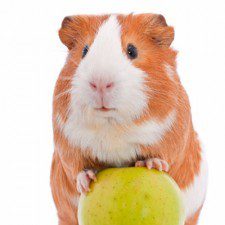Are you considering adopting a Guinea pig? Guinea pigs, or cavies, as they are sometimes called, are very gentle and super cute, and can make great pets for children. While caring for a Guinea pig isn’t difficult, these adorable little furballs do have some very specific care requirements you’ll need to be aware of before you adopt one. A Las Vegas, NV vet discusses basic Guinea pig care in this article.
Cage
There’s no place like home! Make sure your tiny pal is comfortable in his cage. If you only get one cavy, you’ll need a cage that is at least 7.5 square feet. If you’re getting two or more furballs, you’ll need even more room. Choose a cage with a solid bottom, as wire floors can hurt your pet’s tiny paws. Once you have the cage, you’ll need to add a hidey-hole, food bowls, a water bottle, and toys, as well as a proper substrate, such as aspen. Avoid using substrates made from pine or cedar, as they are dangerous to these little ones.
Diet
Making sure your cavy’s diet includes plenty of foods that contain Vitamin C is very important! Guinea pigs can have seed mixes or commercial pellets for their main meals, but you’ll need to supplement these foods with fresh produce, such as Swiss chard or zucchini, to keep your little buddy happy and healthy. Always do your research before introducing something new, as many foods are dangerous to these adorable furballs. We also recommend giving the little one quality grass hay, such as Timothy hay. Ask your vet for specific advice.
Toys
Give your cavy lots of fun toys, including plenty of chewable playthings. Cardboard, plain paper, and items made from safe, suitable wood are a few options. Never give your furball anything with sharp edges that could cut him. Items with dangling strings are also a no-no, as these are choking hazards. Last but not least, stay away from anything coated in dye, varnish, or paint, as well as items ornamented with glitter or other decorations.
Free Time
Spend some quality time with your Guinea pig. Pet him, play with him, and talk to him softly. Just be careful not to scare the little one: let trust and love build slowly.
Our Advice on Guinea Pig Care
What are the critical considerations before adopting a Guinea pig?
Before adopting a Guinea pig, consider their social needs (they thrive with a companion), space requirements (minimum 7.5 sq ft cage), and lifespan (5-7 years). They need a diet rich in Vitamin C, daily interaction, and regular vet check-ups. Ensure you’re ready for the commitment and cost of care.
How big should a cage be for one or more Guinea pigs?
A cage should be at least 7.5 square feet for one Guinea pig. However, since they are social animals, having more than one is often recommended. Aim for a cage of at least 10.5 square feet for two Guinea pigs. Larger spaces are better, allowing them room to play, exercise, and explore.
What essential items should be included in a Guinea pig’s cage?
A Guinea pig’s cage should have a hidey-hole, food bowls, a water bottle, safe toys, and a proper substrate like aspen bedding. Avoid wire floors and pine or cedar substrates; ensure they have a cozy and stimulating environment.
What are safe and unsafe foods for Guinea pigs?
Safe foods for Guinea pigs include fresh produce rich in Vitamin C, like Swiss chard and zucchini, and quality grass hay, such as Timothy hay. Unsafe foods include anything toxic or high in sugar, like chocolate, onions, and sugary treats. Always research before introducing new foods to their diet.
What are some general tips for first-time Guinea pig owners?
First-time Guinea pig owners should consider adopting a pair for socialization, providing a spacious cage, offering a Vitamin C-rich diet, using safe bedding, providing chewable toys, and spending quality time building trust with gentle interaction. Regular vet check-ups and research on their specific needs are essential.
Do you have any questions about Guinea pig care? We can help! Please contact us, your Las Vegas, NV animal clinic, anytime!








